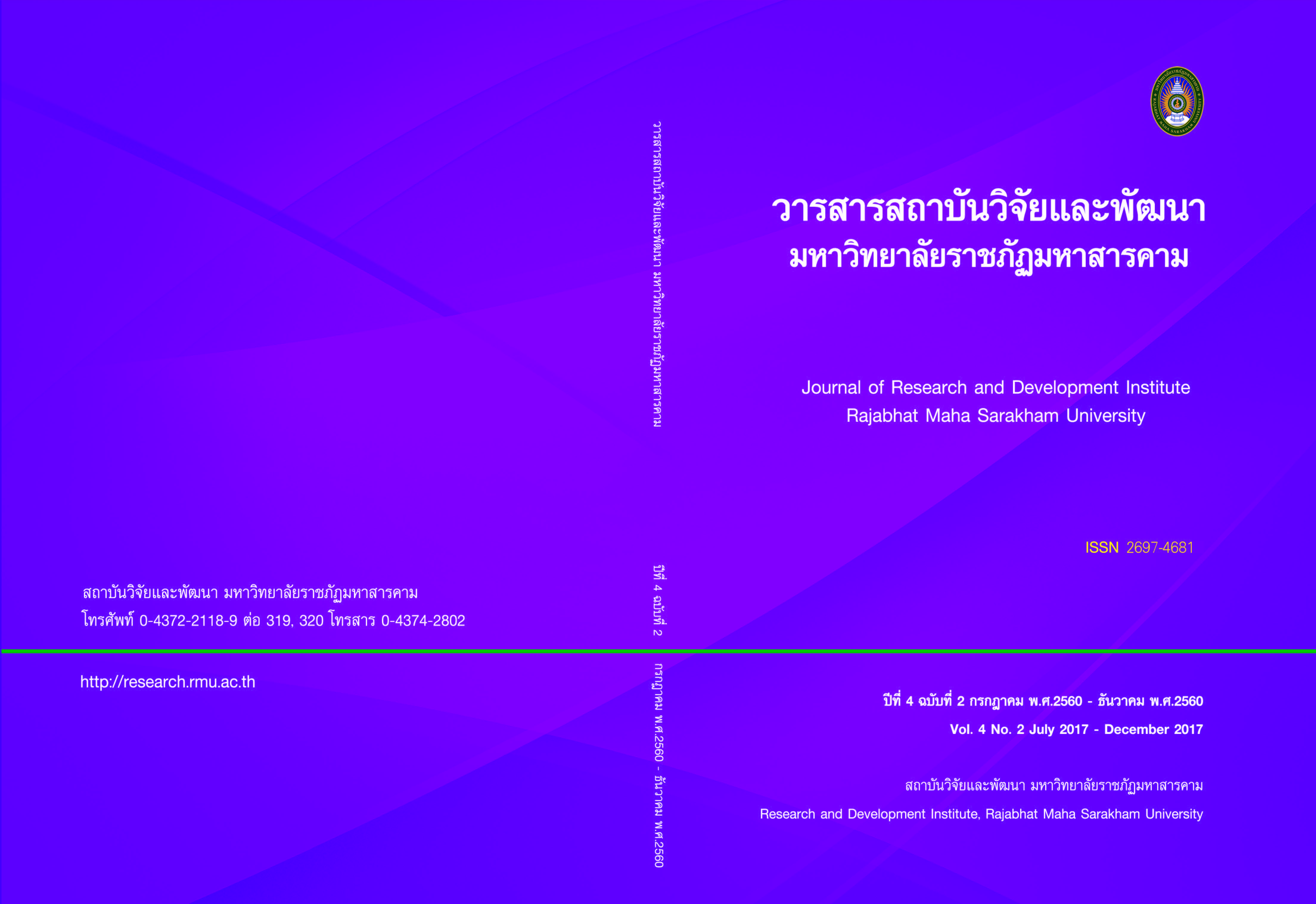From of Political Behavioral Expression of Citizen According to Democratic Way of Life
Abstract
This research is to study Model and behavioral characteristics, expression of citizen political democracy. The instrument used in the research was this study is a study of document research. The study of concepts, the theory and research related to political behavior in accordance with democracy from libraries and electronic media with a variety of methods, starting with the method of logical thinking, pilot study which is to develop a framework approach from theory foundation. The review of the literature related to finding the right balance of substance and investigate the concept to have more credibility by way of integrating various methods. The study found that Model and behavioral characteristics, expression of citizen political democracy means the actions of individual expression that conveys or about politics in various styles. Including the process of thinking, decision making as well as any action, the willingness of the individual media to politics, participation in political activities, the decision involved in the practice and responsible for projects or activities that are related to politics, such as the political demands, political support, push the public policy and anti-government.
References
จรูญ สุภาพ. (2514). การเมือง. กรุงเทพฯ: ไทยวัฒนาพานิช.
จิรโชค (บรรพต) วีระสัย และคณะ. (2538). รัฐศาสตร์ทั่วไป.กรุงเทพฯ: ไทยวัฒนาพานิช
ฐปนรรต พรหมอินทร์, จุมพล หนิมพานิช. (2549). พฤติกรรมทางการเมืองขององค์กรเครือข่ายภาคประชาชน ภายใต้รัฐธรรมนูญแห่งราชอาณาจักรไทย พ.ศ. 2540. กรุงเทพฯ : สำนักงานคณะกรรมการวิจัยแห่งชาติ.
เดชรัต สุขกำเนิด, วิชัย เอกพลากร, ปัตพงษ์ เกษสมบูรณ์. (2545). การประเมินผลกระทบทางสุขภาพเพื่อการสร้างนโยบายสาธารณะเพื่อสุขภาพ : แนวคิด แนวทาง และแนวปฏิบัติ.นนทบุรี : สถาบันวิจัยระบบสาธารณสุข.
ประหยัด หงษ์ทองคำ. (2539). พัฒนาการทางการเมืองโดยกระบวนการปกครองท้องถิ่น. กรุงเทพฯ : บริษัทโรงพิมพ์พาพาส จำกัด.
ปัตพงษ์ เกษสมบูรณ์, (2544). กลไกและกระบวนการสร้างนโยบายสาธารณะเพื่อสุขภาพ : รายงานทบทวนความรู้.นนทบุรี : สถาบันวิจัยระบบสาธารณสุข.
ผาสุก พงษ์ไพจิตรและคณะ. (2545). วิถีชีวิต วิถีสู้ ขบวนการภาคประชาชนร่วมสมัย. เชียงใหม่:ตรัสวิน.
พฤทธิสาณ ชุมพล,สิริพรรณ นกสวน และเอก ตั้งทรัพย์วัฒนา (บรรณาธิการ). (2546). คําและความคิดในรัฐศาสตร์ร่วมสมัย. กรุงเทพ : จุฬาลงกรณ์มหาวิทยาลัย.
มยุรี อนุมานราชธน. (2547). นโยบายสาธารณะ แนวคิด กระบวนการและการวิเคราะห์.เชียงใหม่: คนึงนิจการพิมพ์
ลิขิต ธีรเวคิน. (2552). การสร้างรัฐชาติและการสร้างชาติ. กรุงเทพฯ: สำนักพิมพ์ มหาวิทยาลัยธรรมศาสตร์.
วรวลัญช์ โรจนพล. (2554). กระบวนการและพฤติกรรมทางการเมืองของไทย ในประมวลสาระชุดวิชาการเมืองการปกครองไทย หน่วยที่ 6 หน้า 8-13. นนทบุรี:มหาวิทยาลัยสุโขทัยธรรมาธิราช สาขาวิชารัฐศาสตร์.
วันชัย วัฒนศัพท์. (2547). คู่มือเกี่ยวกับความขัดแย้ง : หลักการและเครื่องมือแก้ปัญหา.กรุงเทพฯ.ศูนย์สันติและธรรมาภิบาล.
วิทยาลัยพัฒนาการปกครองท้องถิ่น สถาบันพระปกเกล้า. (2551). สตรีกับการเมือง: ความจริง เรื่องพื้นที่ทางการเมืองและการขับเคลื่อน. กรุงเทพฯ: วิทยาลัยการพัฒนาการปกครองท้องสถาบันพระปกเกล้า.
วิวัฒน์ เอี่ยมไพรวัน. (2548). วัฒนธรรมทางการเมืองกับพฤติกรรมทางการเมืองไทยในเอกสารการสอนชุดวิชาการเมืองการปกครองไทย หน่วยที่ 11 หน้า 1 - 36. นนทบุรี : มหาวิทยาลัยสุโขทัยธรรมาธิราช สาขาวิชารัฐศาสตร์.
สนุก สิงห์มาตร. (2559). “รูปแบบการแสดงออกทางการเมืองของประชาชนในพื้นที่ภาคตะวันออกเฉียงเหนือ”. วารสาร มจร สังคมศาสตร์ปริทรรศน์. 5 (3),29-44.
สมยศ นาวีการ. (2538). การบริหาร. พิมพ์ครั้งที่ 2. กรุงเทพฯ: ดอกหญ้า.
สุเมธ ทรายแก้ว. (2536). ปัจจัยที่มีผลต่อการมีส่วนร่วมของประชาชนในการจัดการทรัพยากรธรรมชาติ: ศึกษาเฉพาะกรณีโครงการมีส่วนร่วมของประชาชนในการจัดการทรัพยากรธรรมชาติ จังหวัดอุดรธานี. วิทยานิพนธ์
สังคมสงเคราะห์ศาสตรมหาบัณฑิต,สาขาการจัดการ, บัณฑิตวิทยาลัย, มหาวิทยาลัยธรรมศาสตร์.
สุเมธ แสงนิ่มนวล. (2546). แนวทางตัวอย่างการพูดในโอกาสต่าง ๆ.พิมพ์ครั้งที่ 7. กรุงเทพฯ :บุ๊คแบงก์.
อรุณ รักธรรม. (2525). หลักมนุษยสัมพันธ์กับการบริหาร. กรุงเทพฯ : ไทยวัฒนาพานิช.
Amidei,N. (1991). “So you want to make a difference: Advocacy is the key”. In Wallack, Let al..Media Advocacy and Public Health, Power for Prevention.. (pp.28-29) London: SAGE Publications
Kenaphoom. (2013). “The Creating of the Survey Research Conceptual Framework on Public Administration” Valaya Alongkorn Review Vol. 3 No. 2 July–December 2013 : 169– 185.
Kenaphoom. (2014A). “Research Philosophy: Quantity Quality” Journal of Political Science and Law, Rajabhat Kalasin University, 3 (2), 49–51.
Kenaphoom. (2014B). “Establish the Research Conceptual Framework in Public Administration by the Rational Conceptual thinking”. PhetchabunRajabhat Journal, 16 (1) : January–June 2014 : 1–19.
Kenaphoom. (2014D). “The creating of Quantitative Research Conceptual Framework of Public Administration by Literature Review”. Udonthani Rajabhat University Journal of Humanities and Social Science, 3 (1) : January–June 2014.
Kenaphoom. (2015). “The research Conceptual Framework Establishment by the Grounded Theory” VRU Research and Development Journal,10 (3) (September–December, 2015)
Lyman, Stanford, M. (ed.). (1995). Social Movements, Critiques, Concept, Case Studies. Macmillan.
Turner, Ralph H., & Killian, Lewis. (1957). Collective Behavior. Englewood Cliffs, J.J.: PrenticeHall.
Wallack, L., et al. (1993). Madia Advocacy and Public Health : Power for Prevention. Newbury Park: Sage.
Downloads
Published
How to Cite
Issue
Section
License
Articles that are published are copyrighted by the authors of the articles







